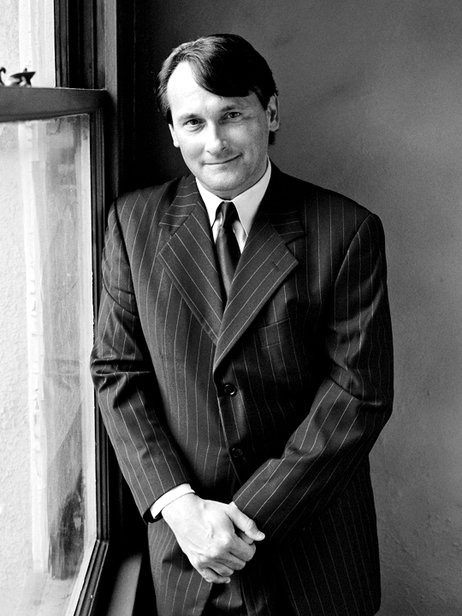Christopher O’Riley’s Velvet Touch

ABOVE: CHRISTOPHER O’RILEY. PHOTO COURTESY OF WENDY LYNCH
Christopher O’Riley is reimagining classical music for modern audiences with renditions of Velvet Underground songs. O’Riley, a trained pianist and internationally renowned performer, has bended genres before, interpreting Radiohead songs into melodic, melancholy, aching piano pieces. O’Riley, who hosts the NPR show From The Top, debuted his Radiohead-for-piano pieces on the show as a way to prank classical music snobs. But the beautiful songs soon won new fans on both side of the music aisle. Symphony-goers started hitting up rock concerts, and rockers donned tux and tails for Carnegie Hall concertos.
Yet, O’Riley’s latest choice of legendary rock group to musically remold is more personal. O’Riley met Andy Warhol through a mutual friend, the art collector Stuart Pivar, and played piano at Andy’s funeral. This evening, O’Riley will be debuting his Velvet Underground variations at a private event at Pivar’s Manhattan home, in honor of former Warhol superstar Ultra Violet.

ROYAL YOUNG: When did you decide to start working on classical renditions of Velvet Underground songs?
CHRISTOPHER O’RILEY: I had known Andy and played at his funeral. It took awhile to get started on the music and get really familiar. If I do a body of work, it will probably segue more into the Nico stuff. They only sold 8,000 copies of the first Velvet Underground record, but everyone who bought a copy started a band. But for my purposes, Nico is more in my wheelhouse. The more heavily Lou Reed pieces are more blues and pretty monolithic. But “Heroin” I will do, and a perfect song from the Velvet years is “Chelsea Girls,” that was made for piano variations.
YOUNG: Is there something you find more inspiring about Nico’s tone or is it a matter of musically being more suited to piano?
O’RILEY: It’s funny because she complained about all the strings and flutes on her first record. She wanted more guitar. She just hated the sound of the flute. Just the songs themselves that she does, I guess the producer thought they lent themselves to that sort of sound environment. I get the sophistication of her songwriting, and I think that’s where they went the wrong way with all the flutes. I like to think that in addressing some of the choices she had felt her producer made so poorly, I am making them right.
YOUNG: Absolutely. How did you end up playing at Andy’s funeral?
O’RILEY: Well, the man who introduced me to Andy was Stuart Pivar, who was a good friend of Andy’s. They went to a lot of auctions together and they always went to the flea market together. He and Andy co-founded the New York Academy of Art, which was a very sort of classically-minded art school—you know, figure drawing and all of those things. Andy would take a class once in awhile. I was friends with someone who was putting on opera productions at New York Academy of Art. He took me to Stuart’s house, because he knew Stuart was the musical type. Then we started having these weekly soirées at Stuart’s apartment, which is this fantastically baroque place with a balcony. Stuart’s friends would come and listen: Ford models, art collectors, expats coming through town. We would have intimate performances playing chamber music. One day I looked up at the balcony and there was Andy. We became friends after that.
YOUNG: Did you have any inkling then that so many years later you would be interpreting music he was involved in?
O’RILEY: I had no idea. At that point I was only doing classical music. In grade school and high school, I had a rock band and was playing jazz professionally, but I was pretty towing the line in terms of what I was doing in music. But then Andy got me a Bombay Gin ad. They set up this shot with me in a blue tux and then the keys of my piano flying over to this Bombay Gin bottle. Then Andy suggested I do an Absolut O’Riley concert and what came from that was five years of Absolut concerto concerts at Avery Fischer Hall. It was kind of amazing.
YOUNG: Is that the gateway that opened you up to thinking of music differently or more fluidly?
O’RILEY: I think any involvement with living composers is a good thing. Dealing with music as a contemporary form and not something in a museum definitely led to my confidence to do my own things.
YOUNG: So music as something living rather than a dusty antique?
O’RILEY: Absolutely.
YOUNG: And why Radiohead?
O’RILEY: I think it was just reading about them. There was such critical buzz, it seemed impossible not to check out. I was in a jazz rock band in high school; during the ’80s I listened to The Smiths and The Cure; I was pretty passionate about the Cocteau Twins and Peter Gabriel. That had been my last real engagement with rock music as a listener, then I was touring and being pretty serious about the classical. It was on my radio show From The Top, which is an NPR program for teenage classical musicians. There is a halfway point on the show, which became my solo piano spot, and when I started running out of Bach preludes and Chopin preludes I had just heard OK Computer and was passionate about all their stuff. Coming from a snobby classical background, when you hear a Mahler symphony, there are no weak tracks. Every Radiohead track was a great track. I did an arrangement of “Karma Police.” It was a nice way of pranking the radio audience. We started getting emails into the program asking, “Who is this Mr. Head and where can I find more of his beautiful music?”
CHRISTOPHER O’RILEY WILL DEBUT HIS VELVET UNDERGROUND ARRANGEMENTS TONIGHT AT STUART PIVAR’S RESIDENCE. FOR MORE ON THE ARTIST, PLEASE VISIT HIS WEBSITE.






